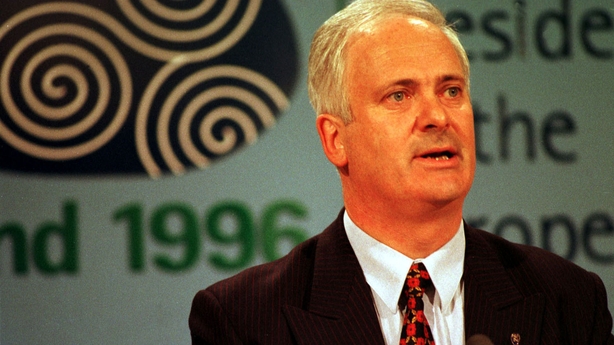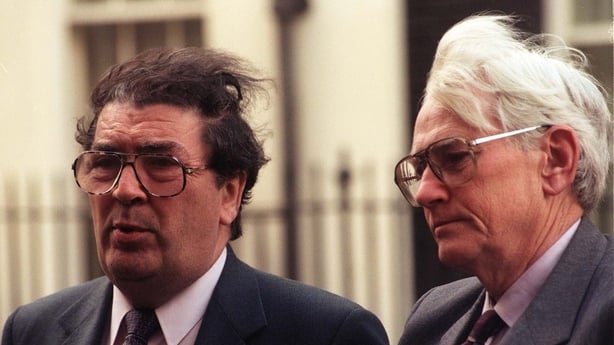By David McCullagh, Conor McMorrow and Justin McCarthy
Politicians are no different to the rest of us. When they're under pressure, they can get grumpy; sometimes they bad mouth their enemies – or more often their colleagues; and they can say things in the heat of an argument that might be better left unsaid.
But unlike the rest of us, politicians frequently have the angry words they say in private written down. And now, thanks to the release of the State Papers, we get to read them.
Take John Bruton, for instance. The taoiseach was frustrated by constantly being asked about the peace process. He complained that "reiteration of the same points every day, especially on the decommissioning of arms… creates artificial pressures and expectations which are not helpful to those in the delicate process of negotiations".
During a visit to Cork a journalist asked him a number of questions about local issues, before raising an issue about the North. Bruton exploded, saying he was "sick answering questions about the f***ing peace process".
It's just as well the good people of Cork didn’t know what else the Taoiseach was saying about them in private
A few days later, he wrote from his home in Meath to the management of Cork radio station 96FM, to "apologise for any offence caused to your reporter Cathy Farrell, by anything I said on the occasion of a recent visit to Cork when she interviewed me…".
The taoiseach admitted that he "became upset" when the interview turned to Northern Ireland. "I did express my concern subsequently about the position I found myself in. I am very sorry that, in so doing, I gave offence to… Cathy Farrell for whose work as a reporter I have… a high regard...".
It’s just as well the good people of Cork didn’t know what else the taoiseach was saying about them in private. During a phone conversation, British prime minister John Major mentioned that he was going to France. Mr Bruton replied: "Oh good. I’d prefer to be there that where I am going to be… I’m going to Cork!"

'Difficult' Trimble
Then there was Ulster Unionist leader David Trimble, a key player in the peace process who would go on to win a Nobel Peace Prize in 1998.
Trimble had a reputation for being short-tempered. His party colleague, Ken Maginnis, referred to him privately as "dour" and "quite unfriendly", while tánaiste Dick Spring complained that Trimble had sent an "offensive reply" to him, and asked the British to do what they could to "secure a more forthcoming and responsible attitude" from him.
"Those accompanying Trimble had been perhaps a little embarrassed"
But northern secretary Patrick Mayhew had his own problems with Trimble, describing one meeting with him as "difficult: the 'usual discourtesies' were observed. Those accompanying Trimble had been perhaps a little embarrassed [by his behaviour]…".
On another occasion, Mayhew speculated that the reason for Trimble’s prickly attitude was his fear of being outflanked by the DUP: "With Paisley behind him… Trimble evidently wished to show his macho credentials…".
Trimble would share his Nobel Prize with John Hume – another man who could provoke strong reactions. In December 1995, Sir John Wheeler, Minister of State at the Northern Ireland Office, referred to him derisively as the "Londonderry Saint" and said "he could never understand the appeal and influence" of the SDLP leader. The Irish Ambassador to London, Ted Barrington, to whom the remark was made, "felt obliged to defend Hume’s record".
Hume's health a worry
Three months later, senior Department of Foreign Affairs official Seán Ó hUiginn visited Hume at his home in Derry, finding him in "a bitter and difficult mood. He was also in bad shape personally, and concerned about his health problems, well above and beyond the usual measure". Hume was deeply distressed by the ending of the IRA ceasefire, and critical of both the British and Irish Governments.
He believed he would be able to secure a resumption of the IRA ceasefire "in ten days", if it were not for the way the two Governments were handling the situation. Ó hUiginn found his "hard line" against Dublin worrying.
"His resentment seems based on a belief that the Irish Government is ‘distancing’ the Northern nationalists and failing to understand the dangers of the present Unionist agenda to roll back Dublin’s role. He is genuinely dismayed and believes the present programme will prove disastrous… it seems his unquestioned assumption, as it is [deputy SDLP leader Seamus] Mallon’s, that sufficiently resolute action by the Irish Government could have staved this off…".

Hume’s poor health was a concern for many people. Seamus Mallon – who at times was exasperated by his leader’s tendency to do his own thing without reference to colleagues – told an Irish official that he was worried about Hume’s health, "in particular at the long-term effects of the strong medication which is currently being prescribed for him".
Sinn Féin leader Gerry Adams was reported to be worried too about "Hume’s mood swings" and the possibility that he might have to leave politics for health reasons. In June 1994, he told Belfast solicitor Paddy McGrory that Hume had visited Martin McGuinness to talk about various problems "and, according to Adams, literally cried on McGuinness’s shoulder".
Clearly, Hume took considerable risks and was under incredible strain throughout the peace process. Fortunately for that process, his health held out long enough to see it through.
Based on documents now available to view in the National Archives of Ireland.

